 |
|
|

BOOK SALE - I'm selling off some scholarly books via Amazon Marketplace. Have a look!

|
2007
April
30
|
Again, I'm uploading this entry early. Read tomorrow's news today!
Or even the day after tomorrow's news!
A missing menu in Windows Vista
Once you settle into Windows Vista, you'll notice, as I did, that
when you're looking at the contents of a folder,
the menu indicated with the arrow in the picture below is not normally
visible.
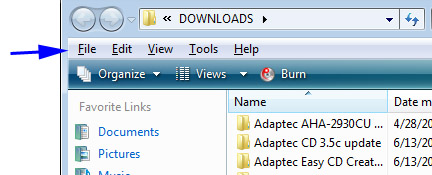
To make it visible, press and release the Alt key.
Once you have it there, do yourself a favor.
Choose Tools, Folder Options, View, and make these settings:

That is:
- Always show menus, so the menu we're talking about will always be there;
- Show hidden files and folders, so you'll see a little more of your environment; and,
most importantly,
- Do not hide extensions of known file types, so you'll see BLAH.EXE or BLAH.TXT or
BLAH.JPG rather than just BLAH.
In my opinion, hiding the extensions is a security hole.
It's Windows' default, but it shouldn't be.
People will send you SOMETHING.GIF.EXE and you'll think it's SOMETHING.GIF and open it.
Permanent link to this entry
Still more Vista tips
Can't unblock files? When you download a program (an .exe file) from the Internet,
Windows flags it as having come from another machine, and you get asked for permission every
time you run it. You can right-click and choose Properties, Unblock, to clear away this flag.
Except that you can't do this in Vista if you've moved the file into Program Files.
Nor do you get an error message. They should at least give an error message explaining
what's going on.
Installing Visual Studio 2005: Sadly, this (perhaps Microsoft's finest product) is not
compatible with Vista! At least not until you patch it.
When installing, you'll get the message "This program has known compatibility issues" about
three times. Each time, click "Run program." After it's installed, download and apply
the enormous
VS 2005 Service Pack 1
and then the medium-sized
VS 2005 Service Pack 1 Update for Vista.
Allow an extremely long time for each of these; there will be several 15-minute periods
when each of them seems to be doing nothing.
The Start Menu has moved: The Start Menu for all users is no longer in:
C:\Documents and Settings\All Users\Start Menu.
Now It's in
C:\ProgramData\Microsoft\Windows\Start Menu.
That's important because many installation programs write into that directory.
Fortunately, if they write to
%ALLUSERSPROFILE%\Start Menu
as they should,
Vista will redirect what they're writing so that it goes into the right place
(even though, as given, that path doesn't include Microsoft\Windows).
Permanent link to this entry


|

|
2007
April
29
|
Nikon Coolscan III LS-30 under Windows Vista (32-bit)
See also my notes about this scanner under Windows XP,
here.
This information pertains only to 32-bit versions of Windows.
If you are using a 64-bit version, click here.
 The Nikon Coolscan III LS-30 film scanner is a SCSI device and is a bit tricky to get working
under Windows XP and Vista.
Here's how I got mine working under Vista.
I am using an Adaptec 2930 SCSI card, but others should work equally well.
The Nikon Coolscan III LS-30 film scanner is a SCSI device and is a bit tricky to get working
under Windows XP and Vista.
Here's how I got mine working under Vista.
I am using an Adaptec 2930 SCSI card, but others should work equally well.
Please note that I do not work for Nikon and do not have any information other than what I am
posting here. If you need someone to "talk you through" setup procedures, please find someone
locally who is familiar with SCSI equipment and with Windows Vista.
If called upon to give substantial help to anyone
other than my own students and colleagues, I'll have to charge a consulting fee.
-
I assume you are using an administrator account and you know about "Run as Administrator"
and the basics of Vista security.
This goes for running the application software, too. So far, I have
not tested whether a "basic user" can run Nikon Scan successfully. Probably so, but I don't know.
I've been running with an administrator account, which is the first account created after
installing Vista. Because of the way Vista works, such an account does not have administrator
privileges continuously the way it would have in earlier versions of Windows.
-
Download and unpack Nikon Scan 3.1.2
(downloadable from Nikon); other versions won't do. (If you are going to use Vuescan, you don't
actually have to install Nikon Scan, but you do need the driver files that come with it.)
-
The scanner does not need a driver in order to work, and Nikon does not provide one.
But Windows is implacable! It will keep saying "Found New Hardware"
every time you turn the scanner on.
One solution (which I have not tried) is to tell Vista to stop trying to install a driver.
The other solution is to install the LS2000 driver, whose INF file also declares it to
be a driver for the LS-30. To do that, simply tell Vista to look
among the Nikon Scan files that you unpacked. The driver will be found and installed.
-
At this point you can use the Coolscan with
Vuescan but not Nikon Scan.
(We'll get to that shortly.)
It's worth downloading the trial version
of Vuescan to see if it works, for troubleshooting purposes.
Note that Vuescan normally unpacks itself into C:\VUESCAN and sets up a link on the desktop
but is not uninstallable from the Control Panel.
This is somewhat uncouth.
To uninstall Vuescan you have to manually delete everything.
-
Install Nikon Scan, try it out,
and you'll see that it can't communicate with the scanner.
That's because there is no ASPI driver installed. Here is how to install one.
-
Go to Adaptec, search for "ASPI," and find
Adaptec ASPI 4.71 (for Windows XP).
Download it and run it. It will unpack a set of files into C:\ADAPTEC\ASPI.
-
Don't use ASPIINST.EXE to install ASPI — it won't work
(and didn't work in XP either).
Instead, open All Programs, Accessories, and right-click on Command Prompt
and choose Run as Administrator. Then type the command:
C:\ADAPTEC\ASPI\install.bat xp32
(giving the correct drive and folder if it wasn't C:\ADAPTEC\ASPI). This should
copy 3 files into place.
-
Reboot.
-
Optional: If you want to verify that you have ASPI installed, go to
C:\ADAPTEC\ASPI again, right-click on ASPICHK.EXE, choose Properties, and set Windows XP SP2
compatibility. Until you do that, ASPICHK won't work because it thinks it's in a strange and
alien operating system.
-
Now Nikon Scan should work. Remember to have the scanner turned on when you boot up.
Permanent link to this entry
Vista pre-logon Num Lock setting
I use a compact keyboard that uses letter keys for the numeric keypad, like a laptop.
In order for me to type my password, Num Lock has to be off when I log on to Windows.
Just like in Windows XP, the pre-logon value of Num Lock is controlled by the
registry key
HKEY_USERS\.Default\Control Panel\Keyboard\InitialKeyboardIndicators
which should be 2 for on, or 0 for off.
Bizarrely, Vista had it set to 2147483648. I changed it to 0 and my keyboard is
working as it should.
Actually, 2147483648 = binary 100000000000000000000000000000000000, which is not
as bizarre as it first looked. I wonder if this is a mistake for all zeroes, or if that topmost 1
means something.
Permanent link to this entry
More Vista miscellany
In Control Panel, Add/Remove Programs is now called Programs and Features.
The quickest way to link to an FTP site
(such as the place you upload your web pages)
is to create a shortcut to:
explorer ftp://user:password@www.somewhere.com/webpages/etc
(or whatever the path should be). I think this also works in previous versions of Windows.
You can leave out the password if you want to be prompted for it.
The only hardware I've found so far that isn't completely supported by Vista is my
Creative Labs AudioPCI Sound Blaster. Actually, only the game port on it is unsupported.
The sound card works fine.
If you're a computer criminal wanting to create a spambot virus,
I suggest you go jump in the lake.
But if you don't do that, I suggest you target the Macintosh. The world is full of Macs that
are wide-open targets because their owners are sure that there will never
be any Macintosh viruses. Vista, on the other hand, is distinctly harder to get into than
Windows used to be.
Permanent link to this entry


|

|
2007
April
28
|
Making video DVDs the easy way
Windows DVD Maker in Windows Vista
Lots of us write programs that generate video output of some kind
which we would like to burn onto video DVDs.
Windows Vista provides the easiest way yet to do this.
The reason is that Windows DVD Maker's project file format is XML.
Here's an example:
<BurnWizard>
<Content>
<ContentFile Filename="C:\vids\alpha.avi"/>
<ContentFile Filename="C:\vids\beta.avi"/>
</Content>
<Title>Your Title Goes Here</Title>
<Style>Full Screen</Style>
<Font Name="Segoe UI" Color="0xFFFFFDA4"
Bold="0" Italic="0"/>
<Button Play="Play" Scenes="Scenes" Notes="Notes"/>
<Notes>Notes would go here.</Notes>
<InsetVideo></InsetVideo>
<BackgroundVideo></BackgroundVideo>
<MenuAudio></MenuAudio>
<SceneButtonName></SceneButtonName>
<SlideShow Transition="Cross fade" PanZoom="1"
MatchMusic="0" Length="7.000000"/>
</BurnWizard>
This is a file saved from DVD Maker (with extension .msdvd), but you can
equally well generate such a file with your own software and then let Vista do the burning.
Windows DVD Maker is included with Vista Home Premium and Vista Ultimate (not Basic or Business).
More information about programming it is
here
(never mind the typos in their XML),
and also
here.
This is not the only software that will burn DVDs from an XML description.
ConvertXToDVD is another,
which I haven't tried yet.
I'm trying to find out what others are out there.
I know the Nero API will take XML files from within a program, but can anyone
tell me whether any version of Nero Vision (the application) will do so?
By the way, I'm now running Microsoft Windows Vista Ultimate on Minerva, my main
computer. The computer dual-boots Vista and XP, and so far, XP is what I still do my real
work with. I'm going to try out my hardware and software, item by item, under Vista before
taking the plunge and upgrading the main disk.
Permanent link to this entry
The Missouri State Social Work Scandal
The School of Social Work at
Missouri State University has really gotten itself in trouble.
The president of that university has threatened
to shut the School of Social Work down in response to an
outside review
that suggested doing so.
That
outside review
is a remarkable piece of prose, written by two deans of social work schools at other universities,
who were hired to come in and troubleshoot the Missouri one.
The scandal broke when the Alliance Defense Fund (which is a
sort of Christian ACLU that defends freedom of religious expression)
brought a lawsuit on behalf of a student.
According to the lawsuit, a professor assigned the student to write a letter to a legislator
supporting adoption of children by gays and lesbians.
The student didn't want to do so, and besides,
it's massively improper (maybe even illegal)
for a professor (himself a state employee) to pressure a student or subordinate
to promote a political position.
(In Georgia, I think it would actually be against the law for me to do such a thing.)
Reportedly, the professor also made other improper "assignments" involving sexual behavior.
For refusing, the student was subjected to an "ethics investigation" and punished.
While not admitting all of the allegations, Missouri State University
settled the lawsuit immediately and
conducted a harrowing (but proper) review of the School of Social Work.
The lawsuit did not ask for exorbitant damages. The student got her record cleared and got
several years of free tuition — not millions of dollars in punitive damages or anything
like that. The university was probably grateful to get off so easily. This kind of scandal
could have blown up much bigger.
At times like these I'm glad to breathe the free air of the University of Georgia.
For all our faults,
we are a campus that tolerates diversity (instead of just talking about tolerating
diversity), and that means tolerating all parts of the political spectrum, not just the
avant-garde. Also, our institution has the good sense not to take positions,
as a whole, on controversies. Instead, political activism
is left to individuals, as it should be.
Permanent link to this entry


|

|
2007
April
27
|
Miscellany
If you like endless loops, read
this.
The Earth seems to have
captured an asteroid
as a temporary satellite.
I wonder how many times this has happened in the past with objects bright enough to be visible.
Latest excuse:
If you want to misuse the Internet, then leave your wireless network adapter
unsecured so you can
claim
somebody
else drove by and used it.
If, of course, you are a rational and law-abiding citizen, never set up an unsecured
wireless network, or people will drive by and use it, and probably read your confidential
data in the process. In my opinion, wireless network adapters ought to come right out of the box
with unique encryption keys already set, so that nobody would use them without setting one.
Speaking of computer safety, do you have backups of your important files?
This evening, about $140 at Office Max bought us a 500-GB external USB 2.0 hard disk.
That's enough to make full backups of both our machines.
Then I'll store it in my office so that even if the house gets struck by lightning,
we'll still have backups.
And in 6 months I'll spend another $140, or less, for another such drive, to use as the second
backup disk. I don't like to erase a backup until I've made another backup of the same data.
Permanent link to this entry


|

|
2007
April
26
|
New blog
Don't read my blog today. Read Cathy's.
(For the full text of Cathy's blog, click here.)
Permanent link to this entry


|

|
2007
April
25
|
What Windows Vista is really all about
This is the first Notebook entry to be written using Windows Vista.
I'm using Release Candidate 1, which expires June 1, but I'll probably
have the real thing (Vista Ultimate) in a few days.
Notoriously, Microsoft can't tell me why any of its products is superior.
(They named their brilliant object-oriented OS API ".NET Framework" as if it were
something for networks, thereby successfully concealing how good it was.)
So I turned to
Mark Minasi to find out what Vista is really
all about.
This
book is where the answers are.
Fundamentally, Vista is about security.
It's the first version of Windows where you really
can't pretend you're still running Windows 95.
You can still run Windows 95 programs, and even Windows 3.1 programs,
if they're reasonably well-behaved, but you can't turn off all the security
provisions and log on as Administrator all the time.
You can't take the helmet off, or at least you can't keep it
off very long.
Here are the key ideas:
(1) Even Administrator isn't Administrator any more.
That is, even administrator accounts don't run with "elevated" privileges
all the time. When an operation comes along that requres elevated privileges,
you get a pop-up like this:
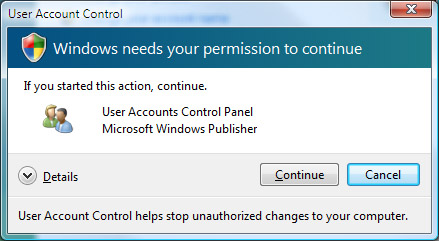
This corresponds to a paradigm shift that happened with UNIX a while back:
instead of logging on as root, we log on as a regular user and "su root" when
we need privileges.
More importantly, malware can't install itself without your knowledge.
When you click on a web site, that web site cannot install software
on your computer without your consent.
This feature is called User Account Control (UAC) and lots of people hate it.
Don't turn it off — it's there for your protection, and if you turn
it off, virtualization (the next item I'm going to mention) gets turned off too.
Then your old software — the kind that says "Windows XP" on the package
but "Windows 95" in the programmer's head — won't run.
How did I take a screen shot of the UAC popup window?
Normally, Shift-PrtSc or Alt-PrtSc won't pick it up because it's on the
"secure desktop" rather than the ordinary desktop.
(This keeps malware from hiding it.)
But in Administrative Tools, Local Security Policy, Security Options,
there's a User Account Control setting to change this.
I learned this here.
(2) Virtualization allows your software to think it's writing in
Program Files or in the machine registry even when it isn't allowed to.
This is a really clever move that will allow some ill-behaved software to run
better under Vista than on a properly secured XP machine. If a program
tries to write where it shouldn't, Vista will quietly create a "virtual" Program Files
folder or machine registry that is stored in per-user setting space (i.e., it belongs just
to the user account that created it). That means your programs can still write their
custom settings in Program Files, and when they do, each user will get his own
separate set of settings.
(3) Documents and Settings and My Documents have been renamed
Users and Documents respectively.
Hurrah! The path is shorter and no longer contains spaces.
But woe to any program that tries to write in Documents and Settings.
It simply can't do it. Documents and Settings still exists, as a hidden folder,
so that nothing else will create it accidentally. Programs that try to write
there will simply crash. (I don't know whether the compatibility modes for
running older software will catch references to Documents and Settings and
redirect them; maybe so; I'm checking.)
Proper Windows software, of course, never writes in Documents and Settings.
That name is unlikely to be hard-coded into programs because it didn't work in
Windows 95 and 98.
(4) File versioning is here — that is, past versions of your files
are saved and can be retrieved. I haven't looked into this yet; presumably
there's a capacity limit.
(5) DVDs are first-class citizens and are supported like CDs.
That's what's new. The "Aero" user interface is, in my opinion, a bit slow and I'm
going to turn it off. (Note: When I switched to the "Classic" desktop theme,
Vista suddenly got a lot faster. A word to the wise!)
Permanent link to this entry
Good for a few chuckles
You can buy the title of "Duke" or "Lord"
here
and also
here.
Apparently British law allows you to change your name in such a way that a title
is part of it, provided you're not impersonating anybody else.
That's the first chap's theory.
The second fellow believes that if you own a tiny bit of Scottish land, you're
entitled to a title with it.
I doubt that either theory would hold up in court.
What kind of person would want to have a title he didn't earn or inherit?
Maybe I'm being too American here...
Or maybe these things are actually being purchased as gag gifts.
Read the testimonials carefully.
Permanent link to this entry


|

|
2007
April
24
|
Web page size considerations
This page has just been slightly redesigned, making its
minimum width
about 50 pixels narrower,
so that it can be viewed in a
768-pixel-wide browser (which gives about 750 pixels for the web page itself).
That's because Tablet PC screens are 768 pixels wide and so are other
1024×768 monitors that happened to be turned upright (in portrait mode).
Those are the narrowest screens in wide use.
Today I was asked how to set the dots per inch for a picture to be displayed
on the Web. The answer? It doesn't matter in the least. JPEG and several other
file formats let you set a number of pixels per inch, but that's only for printing.
It doesn't affect how the picture is displayed on the screen, nor how your
graphics software will edit it.
The following two pictures are each 121×176 pixels, but one is designated
300 pixels per inch, and the other, 75. They will print at radically different sizes
if you print them individually with Photoshop,
but on the screen, and when you print a web page, they're the same picture.
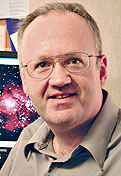
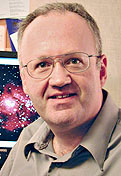
On the Web, everything is displayed at a resolution of 1 pixel per pixel.
Unless, of course, it isn't — but if you tell your video driver
to scale everything, results are often ugly, so I don't encourage it.
Permanent link to this entry
Miscellany
Vista apprehension:
One of my consulting projects is apparently going to require Windows Vista,
so I'm going to put Vista Ultimate on my development machine — in dual-boot mode.
I'm hearing all sorts of contradictory things about whether it will run the
software I already have. XP to Vista is a much bigger change than 2000 to XP.
Congress is breathing
down the necks of the airline industry — mostly about schedules
(some of which are "deceptive"), but I hope they'll get to the lost-luggage issue eventually.
And here is an interesting piece by
economist Steven Landsburg about another kind of environmental harm done by cars.
He's referring, not to pollution, but to the huge amount of land that is laid waste
so that we can park them.
Think about the surface area of parking lots and parking spaces, both used and unused.
That much land is cleared of vegetation and kept out of more productive uses.
This is related to something I've been saying for a while. One of my heretical opinions
is that the reason universities have chronic, severe parking shortages is that
parking is not expensive enough. That is, they don't charge what it actually costs,
so they never have enough. If parking doesn't pay its own way, then everybody else has
to subsidize it, whether they know it or not.
Permanent link to this entry


|

|
2007
April
23
|
A wildfire visible from space
And apparently smellable from 200 miles away

When we woke up yesterday morning, the entire county smelled like a forest fire, and
the smoke was reportedly coming from a wildfire that
has been burning for several days on the north side of the Okefenokee Swamp, 200 miles south
of us. The smell has also been reported in Atlanta.
I'm a bit skeptical because the GOES-East satellite image, which you see here, shows the smoke
drifting to the southwest and extending only about 60 miles.
But it's an interesting picture nonetheless. I grabbed it from
the GOES-East web site,
enhanced the image, and added labels. The arrow points to the fire.
The light-colored mottle across the southern half of the state is, I'm guessing, farm fields cleared
for planting.
Permanent link to this entry
Windows update won't install (SQL Server, KB921896)
Last night's Windows update was an update to SQL Server Express Edition, which is
apparently something that comes in with Visual Studio.
Mine wouldn't install. I kept getting notified that an update was ready, and then that it
hadn't installed successfully, over and over.
Eventually I found a helpful tech support forum in India,
http://forums.techarena.in/showthread.php?t=700347,
which directed me to the folder
C:\Program Files\Microsoft SQL Server\90\Setup Bootstrap\LOG\Hotfix
and the log files in it. The trouble was that the SQL Express Server wasn't able to start up.
Event Viewer told me why: it didn't have write permission in some subfolder of
C:\Program Files\Microsoft SQL Server\MSSQL.1.
Since this isn't a production server, I simply gave all users full control over the whole folder,
and then the update installed successfully. I could probably narrow this down if security were
important. But in fact SQL Server Express is something I never use.
Permanent link to this entry


|

|
2007
April
22
|
Congratulations to Sharon!
 Sharon, my younger daughter, has just accepted a substantial scholarship offer
from Emory University.
She will spend two years on their
original campus in Oxford, Georgia, and then
move to the main Atlanta campus to finish up.
Sharon, my younger daughter, has just accepted a substantial scholarship offer
from Emory University.
She will spend two years on their
original campus in Oxford, Georgia, and then
move to the main Atlanta campus to finish up.
If you watch lowbrow TV, you've probably seen part of the Emory-at-Oxford campus in the opening
sequence of The Dukes of Hazzard.
In real life, it's a lot more dignified than that!
My favorite Emory slogan is:
EMORY UNIVERSITY — STILL UNDEFEATED AT FOOTBALL
Emory has never played intercollegiate football.
Permanent link to this entry
More Windows war stories
Another thing Raymond Chen tells us a lot about
is the amount of work that went into
making Windows run on defective hardware by cleverly working
around the defects.
PC's are made as cheaply as possible, often nobody knows where,
and quality control consists of trying out one version of Windows briefly.
The next version of Windows comes along and tries to use a little more of the hardware's
capabilities, and the machine crashes.
At one point Microsoft had some interesting exchanges with puzzled Intel engineers before
realizing that a particular set of failures was caused by
overclocking.
Some people expect Windows to make their Intel CPUs run at speeds
that Intel says is too fast for them!
Then there are the bogus device drivers, which tell the operating system they're doing
things they don't actually do. And in one case, a manufacturer started to chew Microsoft out for
misspelling the name of their product. The answer? "It's misspelled in the device
driver that you provided with it."
In other Windows trivia, I've just learned that a windowed .NET application can have a console.
Just tell the compiler it's a console app, and voilà — it works the same as before,
and in addition, there's
a console window which you can write on with Console.WriteLine.
This can be useful as a temporary debugging tactic or for displaying some kind of log information.
The Console package lets you change the console window's title. I suppose that with some digging
around in Win32, you could also make it visible or invisible as needed.
Permanent link to this entry
At the end of the school year...
Here are two words, both in the Oxford English Dictionary:
- examination "testing" (from Latin examen 'test')
- exanimation "killing" (from Latin ex- + anima 'soul')
At this time of year it's sometimes hard to tell one from the other.
Last night (Saturday) was prom night for one or more of the local high schools.
When Melody and I were going to dinner, we saw a long, black
stretch-model Hummer, which struck us as a ridiculous vehicle.
A couple of hours later, I heard on the scanner radio that it had collided with
another stretch limo. Like attracts like, I suppose.
Permanent link to this entry


|

|
2007
April
21
|
Windows war stories
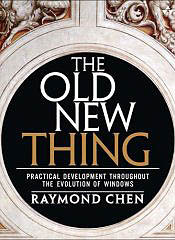 The book I enjoyed reading this evening is
The Old New Thing, by Raymond Chen.
The book I enjoyed reading this evening is
The Old New Thing, by Raymond Chen.
The author is one of Microsoft's leading Windows developers, and the book is a
collection of short accounts of how one or another thing came to be the way it is.
In fact, the book is based on the author's blog, which you can read
here.
One recurring theme is that a lot of work went into making specific commercial software run correctly
even though the software was programmed wrong and only worked in previous versions of
Windows by sheer good luck. Many commercial software developers have made a practice of defying
Microsoft at every turn, disassembling the operating system to use undocumented internal features,
or even modifying the operating system without the user's consent.
Of course, programs built this way will break as soon as Windows undergoes even a tiny change.
We're about to see another wave of this with Windows Vista, which is much pickier about
security violations than earlier versions have been. See
my entry for April Fools' Day, 2004 for more
about what well-intentioned programmers do wrong.
Parts of Chen's book are about Win32 programming and are of less interest to me.
The way I see it, Windows has grown up in two stages:
- Figuring out how to make a windowed OS run smoothly.
That started with the Xerox Star, then comprised the Macintosh,
the X Window System under UNIX, and so forth, more or less concurrently.
Windows was way behind the game until version 3.1.
With Windows NT (Win32), this development was basically complete.
- Figuring out how to make windowed programming easy.
Inherently, a windowed OS is hard for a human being to understand.
All the windows are responding to events and passing messages around.
A great breakthrough occurred about 12 years ago, with Visual Basic
and Borland Delphi, when programming language designers finally
figured out what windowed programming ought to be like.
The Microsoft .NET Framework, of which I am an enthusiastic champion,
brings (2) in step with (1) by providing an operating system API that
is actually made of the right kinds of things. For me, Win32 is a
level of infrastructure that I'd rather not use directly.
Permanent link to this entry


|

|
2007
April
20
|
Miscellany
Superstar course:
Cathy has managed to register for
this course in genetics
and creative writing. Well done, Cathy!
I wish I were in Seattle so I could go to the
Museum of Communications.
[Link corrected.]
The web site is impressive; the museum, I'm told, is even more so.
Yale University has amusing football songs, including "Boola Boola."
Hear them here.
Finally, Peter Erdman has taken a
truly extraordinary wide-field picture
of the nebulae in Orion and surrounding constellations.
It's a mosaic taken in narrow-bandwidth H-alpha light.
Permanent link to this entry


|

|
2007
April
19
|
COMDEX/Spring 1984 Los Angeles — did it exist?
I remember very well going to
COMDEX/Spring,
the computer trade show,
in 1984 in the Los Angeles Convention Center.
It had to be 1984; I had accepted my job at the University of Georgia but
had not yet started it.
And it had to be Los Angeles; I lived there.
This was memorable as the last COMDEX that was not dominated by the
IBM PC architecture. In 1984, there was a wild range of competing computers,
including Apple II, Atari, Commodore, and, on the high end, the newly released
AT&T 3B2, which had an expensive showroom all to itself.
I went to many subsequent spring COMDEXes in Atlanta, which was their usual
location.
But the mystery about the Los Angeles one is that
people are telling me it didn't exist —
that COMDEX/Spring 1984 was in Atlanta.
Can someone confirm that COMDEX/Spring 1984 in Los Angeles was real?
Did they also have a show in Atlanta just a few days away from it?
The answer: It took Pete Albrecht only a few minutes to solve the mystery.
On April 5-7, 1984, COMDEX/Winter was held in Los Angeles.
(Strange definition of "winter.")
COMDEX/Spring was a month later, in Atlanta.
Both are mentioned here;
click for a trip down memory lane.
Permanent link to this entry


|

|
2007
April
18
|
Virginia Tech
Note: These remarks were written within
36 hours of the incident. They do not take account of all the information that came out later.
The world is still in shock from the massacre at Virginia Tech two days ago.
It is doubly sad for me because the German teacher who was killed,
Jamie Bishop, is someone I knew slightly when he was in graduate school
at the University of Georgia.
What I'm afraid of, now, is that there will be an overreaction that will reduce the freedom
of innocent people without making them substantially safer.
We need to remember that this was an extremely rare event.
The Commonwealth of Virginia is
400 years old this year, and this is the first such incident they've ever had.
There's a risk of copycats, especially in the first few weeks, but mass murder is,
thankfully, not a common crime in the United States.
Gun control laws wouldn't have prevented this crime; the perpetrator planned it far enough in advance
that he could easily have gotten guns from another state, or on the black market. Virginia probably
already had a law against bringing guns onto campus without authorization.
(The shooter in the 1966 Texas massacre actually
met armed resistance
from people with deer rifles. Gun control effectively prevented anything like that
from happening this time.)
I do fault the Virginia Tech police for not locking down the campus, or at least patrolling it
very heavily, after the first shooting. If there's a murder on a university campus and the killer is
still at large, security should be tightened down.
Cathy astutely points out that the shooter wanted to commit "suicide by police" and heavy police
patrols would have made it much easier for him to do so without killing so many other people.
It is also important to figure out whether the crime could have been predicted.
Did the student show signs of being severely disturbed?
And this, in turn, feeds right into a notorious mental health dilemma.
Should severely depressed students be expelled from college?
That's standard policy in a lot of places; it means the college is no longer
liable if the student kills himself.
But what a thing to do to a depressed human being!
It's a good way to permanently ruin the career of
someone who otherwise might well have recovered without incident.
If the penalty for being depressed is expulsion, that more or less
guarantees that depressed students will not seek help.
Note added later:
It is now coming out that this person's problem was not depression; it was
something much stranger, but there were lots of signals that he was a dangerous person,
and people should have paid attention to them.
Another note added later:
To sum up, we should focus entirely on how well Virginia Tech handled
a freakish, rare incident rather than trying to hunt down "causes" as if it were
a common event. That would be like evacuating the coast permanently after a tsunami.
In particular, the "breakdown of American society" has little or nothing to do with this,
since the perpetrator wasn't American!
Permanent link to this entry


|

|
2007
April
17
|
|
Our thoughts and prayers are with Virginia Tech
after yesterday's tragedy.
At this stage, all one can do is express puzzlement and hope that some
understanding of this human disaster will eventually emerge.
|
Lights aglow
Melody and I spent Sunday evening fixing up the fluorescent lights in our kitchen.
We have a grand total of 10 48-inch fluorescent tubes above a translucent suspended
ceiling.
And fluorescent lamps are insidious. They get gradually dimmer and more
prone to flickering over the years, without burning out completely.
The ballasts deteriorate insidiously, too. I don't know much about their failure mode
— leakage in the capacitor? — but I know they gradually go out of specification
until they become incompatible with some bulbs, then more bulbs, then all bulbs.
So on Sunday night we replaced a lot of bulbs, and we replaced the 3 most finicky ballasts
(all the magnetic rapid-start type) with
Advance Centium
electronic ballasts, which are much more compatible with bulbs that are slightly out of
specification, even bulbs with a broken cathode.
Here are some discoveries from this great endeavor:
- Thin (F32T8) bulbs aren't supposed to work in old-style (F40T12) fixtures, but in fact,
in our experience GE Ecolux Kitchen & Bath T8 bulbs work fine,
and they even work with aging ballasts
that are starting to have trouble with the bulbs for which they were actually designed.
Hmmm... Is there any reason I shouldn't be doing this? During the early days of thin bulbs,
a few years ago, I installed a couple in place of thick bulbs, and they're still working fine.
On Sunday I installed several more.
- I had a remarkable collection of bulbs with one of the 2 cathodes burned out.
Unlike electronic ballasts, rapid-start (old-style) ballasts heat the cathodes (filaments)
and gradually burn them out. But if only one of the two is burned out, the bulb still
lights, a bit less brightly and less reliably than before; you may think it's a good bulb.
Of course, with an electronic ballast it still is a good bulb.
To check cathodes, use an ohmmeter across the two pins at each end of the bulb.
- You can now get a 5000 K full-spectrum compact fluorescent from Sylvania called
the Supermini Craft Light. It goes in a desk lamp in place of an incandescent bulb.
There are two sizes, 13 and 23 watts, equivalent to conventional 60- and 100-watt bulbs.
Both are safe in fixtures rated for 60 watts. This is a way to get the
advantages of Ott-Lite at a much lower price.
-
Manufacturers' web pages are not up to date. Neither Sylvania nor GE has documentation
on the web for the products that we bought over the weekend!
Permanent link to this entry


|

|
2007
April
16
|
A really good Spanish-English, English-Spanish dictionary
 Let me heartily recommend the
Collins Spanish Unabridged Dictionary.
Let me heartily recommend the
Collins Spanish Unabridged Dictionary.
Melody and I came across it while she was trying to check the translations of some
Spanish terms on her employer's web site.
What is the Spanish for sprayer? Most dictionaries give you a handful of words with
no indication of how they differ. This one, however, picks apart the meanings of the
English word and gives you the Spanish equivalent of each. It even distinguishes
sprayers for insecticides, paint, and nasal spray. Well done!
They also offer similar dictionaries for
German and
French,
but I haven't looked at them.
Permanent link to this entry
Bomb the University of Georgia?
A local politician's joke (?) sounded more like a terroristic threat.
"State Sen. Jim Whitehead ... [a] 10th Congressional District candidate,
was quoted by an Elberton newspaper saying that the university is 'a bunch of liberals,'
adding that, except for the football team, someone ought to bomb it."
I'm quoting the
Athens Banner-Herald; see
also
this copy.
And he wants me to vote for him for Congress now?
In this Notebook, I will never endorse a candidate.
But I reserve the right to de-endorse
some of them!
Permanent link to this entry
Short notes
I've added new information to several recent entires.
Scroll through and look for dark red type.
Microsoft Sound Recorder (in every copy of Windows
under Programs, Accessories, Entertainment) does not run on
computers with more than 2 GB of RAM.
It complains of not enough memory available.
No alternative is provided.
This fact led me to download and install the magnificent
Praat speech analysis package
when all I really wanted to do, two days ago, was
make someone a recording of the pronunciation of a few Latin words.
Here is a fine
biographical sketch of Milton Friedman, who, throughout his career,
made good predictions but was not appreciated by his fellow economists.
He was also one of the people who persuaded Nixon to abolish the draft
(a decision made in 1969, but it didn't take effect until 1973).
(I think one reason McGovern didn't win in '72 is that Nixon was a better liberal!)
Permanent link to this entry


|

|
2007
April
15
|
Putting lots of black on your screen will not "save the earth"
Jeff Duntemann pointed me to
this
web site, which claims that we need to redesign our software to put more
black and dark colors on the screen,
to reduce the energy consumption of the monitor and thereby Save The Earth.
The site cites a
research paper
by a team of scientists at Lawrence Berkeley Laboratory
who suspected that darker computer displays would save energy,
but didn't look closely enough at their own data to realize that
it doesn't work that way.
Their data (on p. 19 of the aforementioned paper) show some energy saving
from a darker screen display on a CRT, but none on an LCD.
(Well, if you don't think about measurement tolerances you might think
there's just a tiny bit.)
And LCDs always use far less energy than CRTs.
The fallacy of the dark screen is the following.
Screens emit light,
and light is energy,
so if we get them to emit less light, we save energy, right?
As my friend Bob Stearns used to say, "R-O-N-G, wrong!"
The letters LCD stand for liquid crystal display.
Liquid crystals are chemicals that change color in response to electricity
(or heat or pressure).
An LCD computer screen is always backlit by a fluorescent light source.
The liquid crystals either transmit the light or block it, depending on their state.
A correspondent points out that it takes electricity to make the liquid crystals
block light. So a dark LCD screen
should use more electricity than a white one.
Rapid motion of the image also uses more electricity because the LCD cells
are overdriven to make them change faster.
Let me make a counterproposal.
To save energy, use light colors on your computer screen
so the user can turn the brightness control down.
Reducing the intensity of the backlighting does save energy,
and it's just the opposite of what will happen if eco-bunglers
force black-on-black displays upon us.
Of course, another factor is that if you make a machine harder to use, you get
less of whatever benefit the machine is supposed to give you — and you
end up wasting something else, probably energy in some other place.
Environmental activists very often ignore this, or even think that
discomfort and inefficiency are virtuous.
Permanent link to this entry


|

|
2007
April
14
|
Uploaded early! Read tomorrow's news today!
Galaxies in Leo
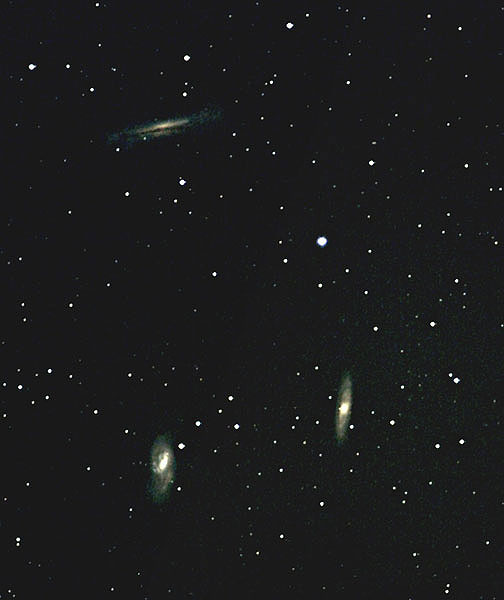
Here you see (top to bottom) the galaxies NGC 3628, M65, and M66 in the constellation Leo.
This is a stack of twelve (yes, twelve) 3-minute exposures with a Canon EOS 20Da and a
Canon 300-mm f/4 lens wide open; you're looking at a small region of the picture.
This was taken in my back yard under magnitude 4 skies.
Permanent link to this entry
The galaxy near the Helix Nebula
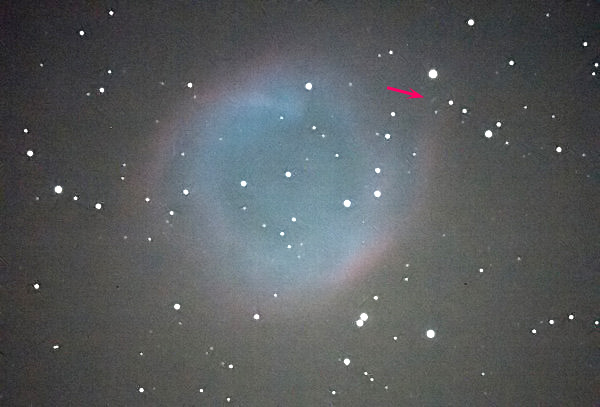
Here's one of my pictures of the Helix Nebula (NGC 7293) from last summer. This is a relatively
nearby gas cloud emitted by a dying star.
But I want to call your attention to the small, faint smudge indicated by the arrow.
It is a much more distant object, apparently a galaxy seen edge-on. It also appears in
some observatory photographs of the Helix Nebula; I invite you to
look for them on Google
right now.
This galaxy is not listed in any major catalogues, and almost nothing is known about it.
It is given the designation 2MASX J22290968-2047179
in the 2-Micron All-Sky Survey (2MASS), and as you can see
here, little is known about it except its apparent
position and color (which is mostly a measure of the effect of the dust clouds in front of it, not the
nature of the galaxy itself). (I thank Dave Riddle for the reference.)
A further communiqué from Dave Riddle tells me this galaxy is also known
as Mitchell Anonymous
Catalogue (MAC) 2229-2047
and is 16th magnitude.
That makes it about 10,000 times fainter than the Andromeda Galaxy.
Yet it is probably bigger than the whole starry sky as seen with the unaided eye from Earth.
Permanent link to this entry


|

|
2007
April
13
|
They still don't get it
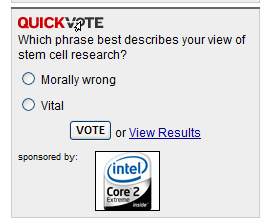 You can misinform people by asking questions
(e.g., "Has he stopped beating his wife?") just as much
as by making statements.
And here's a poll question that misinforms people.
It was taken on CNN.com on April 12.
You can misinform people by asking questions
(e.g., "Has he stopped beating his wife?") just as much
as by making statements.
And here's a poll question that misinforms people.
It was taken on CNN.com on April 12.
The misinformation is the assumption that some people have
moral objections to "stem cell research" per se.
As far as I know, nobody does.
CNN persists in giving the world the impression that
some set of conservative people
are "against stem cell research," with the implication that they don't
want diseases to be cured or suffering to be alleviated.
In reality, the controversy is only about the destruction of
human embryos. There are plenty of other ways to obtain stem cells.
Nobody is against stem cell research. Only the method of
obtaining stem cells is controversial.
Permanent link to this entry
Miscellany
Note the added information in yesterday's item about Christians and poverty.
I want to make it clear that I'm citing actual economic and sociological research, not
partisan preconceptions.
Weird world of finance: Responding to a developing kickback scandal, student-loan providers argue
that free competition would
just confuse people and create "turmoil." (Thanks to Pete Albrecht for the link.)
International security: The University is starting to train researchers on how to deal with
national security risks. There's a training session today, but I don't have time to go.
Anyhow, my main
overseas contact these days is in Scotland. Should I be watching out for bands of Scottish secret
agents, armed with kilts and bagpipes, invading my lab and looking for military secrets?
Does my Harris Tweed jacket mark me as a closet Scot?
A few years ago somebody wanted to liberate the animals in my lab.
I had to explain that we have no lifeforms lower than graduate students.
Permanent link to this entry


|

|
2007
April
11-12
|
Unusually brazen (or foolish?) phisher
Look at the headers on this fake e-mail that was purportedly from Bank of America,
and especially the parts I underlined.
He has named himself "insolent bandit" and has rigged it so that if you reply to
his e-mail, the reply will actually go to Bank of America, not to him,
thus causing him to get caught almost immediately. (If it doesn't go to Bank of America,
it will bounce as undeliverable; and at any moment Bank of America could set up a computer
that would actually receive it.)
I gather the intelligence level of the average phisher is not too high these days.
Permanent link to this entry
Do Christians care about the poor?
Updates April 13.
A common accusation against conservative Christians is that, contrary to our marching orders
from Jesus, we don't care about the poor.
This may be a real failing of some suburban churches that stratify by social class —
but those churches aren't particularly conservative, in my experience.
On the whole, though I think my colleague David Mustard hit the nail on the head with
this remark:
Some people understate the amount
of concern because they measure one's concern by one's willingness to
use the state to take resources from some people and distribute those
resources to other people. Many Christians who are very concerned about
poverty, etc., believe that market mechanisms and private action are more
effective than state redistribution or state regulations.
In short: We believe in helping the poor, but not in forcing you to help the poor,
and we don't think government is the solution to every problem.
Also (in complete agreement with economics experts) we feel that "help" often means
creating business opportunities, employment, etc., not handouts. We don't want to separate
"the poor" into a subclass that we can patronize and look down on while we "help" them.
All too often, people who are into "helping the poor" want to do just that.
These are not just
Dr. Mustard's opinions.
I'm quoting from a paper in which
he cites a whole series of economic and
sociological research results.
See for example the web site of
Arthur C. Brooks
and the
Association for
the Study of Religion, Economics, and Culture.
Both of these emphasize using actual data rather than ideological assumptions.
They also make it clear that if you want to identify religious people,
you must pay attention to actual practice, not self-labeling so that you
don't count "Christians" who only go to church for weddings and funerals.
See especially Brooks's book, Who
Really Cares?
One of the most interesting facts in it is that
(social) conservatives donate more blood than liberals do.
This is not because they're richer; everybody has the same amount of blood,
but some are more willing to share it.
Permanent link to this entry
Miscellany
Who would have thought there were
hundreds of kangaroos just outside Atlanta?
Meanwhile, here's
another stem-cell triumph,
again not involving embryonic stem cells,
and hence free of ethical controversy.
And here's a trip down memory lane
with IBM typewriters. My 1975 Selectric II is still working — I used it to type
envelopes just the other day.
Permanent link to this entry


|

|
2007
April
10
|
Bacteria that improve your brain?
Scientists
at Bristol University have found a bacterial infection that cures depression
by raising your serotonin levels. More precisely, developing an immunity to the bacteria
is what does it; you don't have to have the infection continuously.
Even vaccination with dead bacteria will do it.
This suggests that depression is like allergies: it's a disorder you get
if you don't have enough minor infections in childhood.
Clean-living modern people develop allergies because the immune system doesn't get
enough practice fighting its real enemies; after a while it starts fighting
things that aren't enemies, such as dust or foods. Likewise, it now appears that the
human brain is designed to work better if you've been exposed to Mycobacterium vaccae
than if you haven't. More details
here.
One way of interpreting the experimental results
[my interpretation, not the authors']
is that the body's
mechanism for judging whether you're sick or well is serotonin-based and
gets out of calibration if it
hasn't had a good fight with Mycobacterium in a long time.
On such an interpretation, the essence of depression is that you feel sick when you aren't,
and since there are no physical symptoms, you interpret it as sadness rather than illness.
If others can replicate the results, this treatment will probably be in clinical use quite soon,
because it is already known that Mycobacterium vaccae is safe to give to humans.
The vaccine has been used experimentally in an attempt to raise the body's resistance to cancer
and as a not-too-successful asthma treatment.
The bottom line? We weren't designed to live germ-free.
Permanent link to this entry
Astrophotography on film
On December 15, just before selling my Nikon 180-mm f/2.8 ED IF AF lens,
I took it for a "farewell cruise" at a dark-sky location,
using Elite Chrome 200 film.
Below is a 12-minute exposure of the North America Nebula,
digitally processed with MaxIm DL.
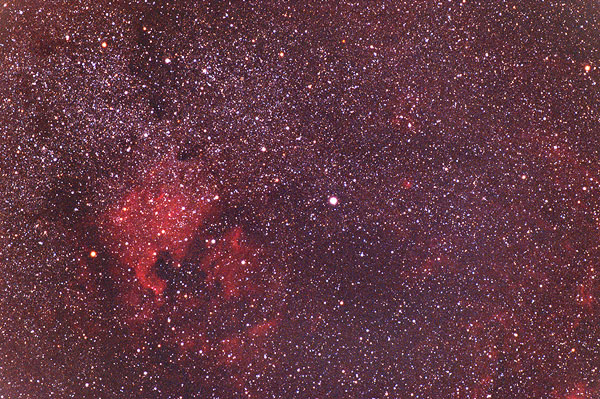
Click to enlarge
Permanent link to this entry
Nikon lens grand finale
The last three pictures taken with the 180/2.8 lens were 10-minute exposures of southern Orion,
two at f/4 and one at f/2.8. Here you see them digitally combined.
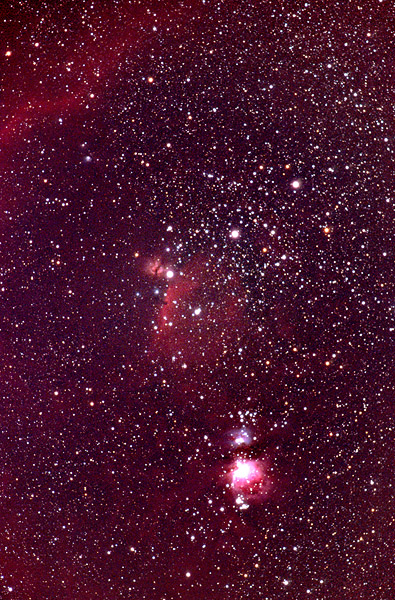
Click to enlarge
This is a picture I have always wanted to take, and I've taken many that were approximations
to it. The bright blob at the lower right is the Orion Nebula. Just left of center you see the star Zeta
Orionis with several nebulae near it; the dark notch in one of them is the Horsehead.
At the upper left is part of Barnard's Loop.
View the image enlarged, and you'll see that one of the white stars in the upper left area
is actually a comet-shaped object, the reflection nebula M78.
Permanent link to this entry


|

|
2007
April
9
|
Film photography isn't dead yet
It took me from December to March to run a roll of Elite Chrome 200 through my
trusty Nikon F3. Here's a picture I snapped in my front yard in December, some
backlit leaves. (Leaves that seem to glow are one of my favorite subjects.)

Tomorrow: some astronomical pictures from the same roll of film.
Permanent link to this entry
Comet Lovejoy, discovered with Canon DSLR
But is it green?
Australian amateur astronomer Terry Lovejoy has
discovered a comet
using a Canon DSLR camera.
Currently south of the equator, the comet is moving into the northern sky
but will only be visible with a telescope.
Coordinates here;
expect more links, with maps, in a few days.
What puzzles me is that the news media are saying the comet is green.
It looks to me as if it's the same color as almost any comet photographed with the same camera.
Compare Lovejoy's picture
to my picture of
Comet Machholz under similar circumstances
(see also this).
DSLRs are sensitive to a blue-green region of the spectrum that color film doesn't pick up very well.
That's why they also produce pictures of
blue nebulae
that we thought were red. Green comets, too.
Admittedly, other comets
come out white,
so I don't entirely understand what's going one.
Permanent link to this entry
Student loans: ticket to poverty?
Now that the subprime-mortgage scandal is winding down, I think the
next overlending crisis
is going to involve student loans.
Plenty of people are eager to lend students more money than they can ever pay back.
Apparently as a result, private-college tuition costs
are skyrocketing. And in ten years, the next generation of yuppies is going to be hurting.
Even bankruptcy
doesn't get you out of paying back student loans.
That's why they're such a good deal for the lender, and such a risk
for the student.
Associated with this is a mentality that the only college worth attending is the one
that almost won't admit you. I tell students every day that this is bad advice.
You shouldn't want to be the weakest student in the college.
And it won't ruin your whole life if your diploma says State University rather
than Harvard. Studies have shown that, except for professional scholars, it almost
doesn't matter at all where you got your degree.
We are no longer a small country with only a few good colleges.
Almost all of them are reasonably good, if they offer what you need.
I would go further. The prestige of a college depends on how good it was 50 years ago;
the quality depends on how good it is now.
Unless you're going to enter college by time machine, you should be looking at present quality,
not past laurels.
Then, take it upon yourself to get a good education when you get there,
even if others are wasting their time partying.
Permanent link to this entry


|

|
2007
April
8
|
|
Feast Day of the Resurrection of Our Lord
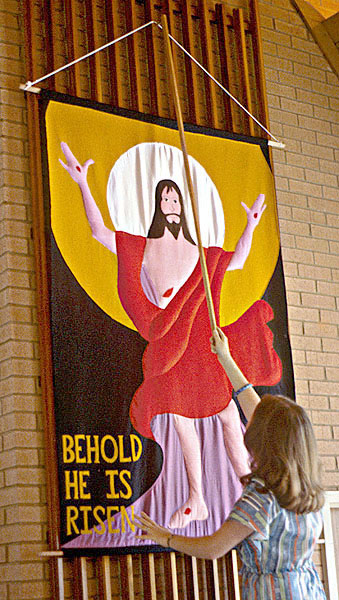
Here you see Melody, back in 1977, installing, at the University
of Georgia Baptist Center, a banner she made that is
based loosely on Matthias Grünewald's
Isenheim altarpiece.
We wish all of you a blessed Easter!
Permanent link to this entry
|

|
 |
2007
April
7
|
Delta episode continued
Further to yesterday's incident, I'm wondering if
outsourcing customer service to India has backfired on Delta Air Lines in a sad way.
The workers in India were helpful and cooperative.
The problem was with the supervisors back in Atlanta.
I wonder if they felt that they no longer need to care about customers
because it's all been outsourced.
(A correspondent points out a much more obvious explanation.
Delta has been in bankruptcy for six months, and most of its best employees have departed.
Those remaining are the ones who are inept or have bad attitudes.
The service bureau in India, on the other hand, isn't affected by the bankruptcy.)
Before the incident was over, Delta found
yet another way to inconvenience me.
I had to take a phone call at 11:55 p.m. Thursday night to tell
the delivery company that my office is not open at night
(which I had already told Delta
when they were arranging delivery).
The waylaid poster finally reached me at 4 p.m. yesterday (Friday).
Will Delta Air Lines actually emerge from bankruptcy as scheduled at the end of this month?
Right now they seem to be acting as if they don't expect to.
How could such a good airline deteriorate so severely in so short a time?
Permanent link to this entry
Miscellany
Microsoft has an excellent (though sparse)
blog about typography
and font design.
Note especially the ClearType tuner
for optimizing the
antialiasing of type on your screen.
Our 16th president, Abraham Lincoln, was not only a statesman and lawyer;
he was also a gadgeteer.
His only patented invention was an inflatable-pontoon contrivance for
getting boats unstuck from shoals.
Permanent link to this entry


|

|
2007
April
6
|
A scientist who believes in God
Dr. Francis Collins, director of the Human Genome Project, is a Christian with views
similar to my own. His personal testimony made the front page of CNN.com
yesterday.
CNN published some replies, indicating that some people thought he turned to Christ
purely out of an irrational, emotional need. I don't think so. I think that he was trying to indicate,
very quickly and in simple words, the intellectual inadequacy of the
atheistic two-story
worldview, in which everything that
isn't mathematics, physics, or chemistry has to be viewed as ultimately meaningless,
including the satisfaction of scientific discovery itself.
Permanent link to this entry
Serious disappointment with Delta Air Lines
Delta Air Lines
is officially in bankruptcy
and apparently not eager to get out.
My lost poster has been found in the Atlanta Airport, but it took
three hours of arguing on the telephone before Delta Air Lines would agree to have it delivered to me.
It's a 2-hour drive from here to the airport, so I wasn't willing to just hop in the car
and go get it.
I had imagined that, upon finding an unclaimed item of
checked baggage with my name, address, and phone number prominently
marked on it, the airline might contact me.
No such luck.
Instead they waited until I phoned them this afternoon; my fax to them on Tuesday morning had yielded
no result.
Then they told me that, by leaving the airport without reporting it missing, I had forfeited
my right to have my baggage delivered. Nonsense. On Sunday night, they were having a baggage-handling
meltdown. If I'd waited in the long line to report it missing, I would
have missed my ground transportation and had to spend the night in the airport. They gave me a phone
number to call, but it was no help; it would only serve people who already had a file number to key in.
So I reported the lost baggage by fax the next morning, less than 24 hours after the loss.
Apparently that wasn't good enough for them.
Now wait a minute. They delayed my baggage. Or in one version of their story, they
didn't; I just didn't stay in the airport long enough to get it. It was either 1 hour late or 4 days
late depending on which Delta agent you ask. All I know is that it didn't come in with the rest of the
baggage from the flight, and they told me at the time that it was apparently lost.
Now they want to penalize me for not
filling out forms in the exact manner specified by their bureaucracy.
Delta used to be a good airline. But dealing with them today,
I saw no eagerness to please the
customer. Indeed, at one point today a clerk hung up on me rudely while I was trying to arrange
to pay the cost of delivering the lost item to Athens!
To add absurdity to injury and insult, their last request,
when they called me to arrange delivery, was that I should go to my office around
midnight to meet the truck. Nonsense again. They finally consented to put the item on a
later truck so that it will arrive during business hours.
Permanent link to this entry


|

|
2007
April
5
|
Short notes
Reincarnated restaurant:
One of my favorite Mexican restaurants, the late lamented Compadres of Athens, Georgia,
has been reincarnated as Cactus Café
in Watkinsville. Yum!
Girls gone weird: The campus newspaper reports
this display
of obnoxious drunken behavior by the members of the Alpha Delta Pi sorority:
"One girl was so drunk on the [45-minute] bus ride to Greensboro [before a formal dinner]
she threw up three times...
Girls were urinating in cups and bottles, then throwing them out the bus windows."
The consequence? Campus Transit will no longer charter buses for sororities or fraternities.
I'm sure I'm not the only one who wants to say, wait a minute.
Non-sorority-members get arrested for acting like that.
Giving the whole fraternity-sorority system a slap on the wrist is the wrong move.
Individuals need to be singled out.
Update: The Athens newspaper has
picked up the story, with more details
(especially that problems of this kind have been recurrent)
and the campus newspaper is also
pursuing it.
It looks like we have a rip-roaring scandal, which I'm not going to continue following
in this Notebook. But I feel very strongly that members of fraternities and sororities
should not be shielded from the consequences of their actions.
What not to blog:
Here is a nice piece
by Jeff Duntemann about what not to put on your web site.
Lots of younger people are telling the world about their wild carousings,
assuming their potential employers will never know.
Permanent link to this entry


|

|
2007
April
4
|
New fonts

Just a quick note: Everybody who uses Windows 2000 or XP should download and
install the
Microsoft Office 2007 file converters.
Besides enabling earlier versions of Word, Excel, etc., to interoperate with
Office 2007's XML-based file formats,
this package also gives you some nice new fonts of which you see
samples above. Each has a bold, italic, and bold italic version.
As I understand it, they were commissioned by Microsoft for Windows Vista.
Consolas, in particular, is good for program listings.
It's much nicer than Courier, which was designed for IBM typewriters
in the 1960s and relied on the typewriter ribbon to thicken it up.
I want to thank graduate student Cody Boisclair for pointing these out to me.
If you like them, you may also like the
Bitstream Vera
fonts, which are freeware,
billed as for Linux but also compatible with Windows.
To install them, download the ZIP file, unzip it, open Control Panel, and drag the .ttf files
into the Fonts folder.
Permanent link to this entry
Miscellany
I was right:
Changing the date of Daylight Saving Time
did
not save any energy.
Maybe Daylight Saving Time itself doesn't save energy.
In fact, a few years ago we were hearing that we needed DST because
of the "outdoor recreation industry." That means more consumption
of energy, doesn't it?
Tech triumph: A heart valve grown
from stem cells that did not involve destroying a human embryo.
(Folks, despite the confusion in the mass media, Christians do not object to stem cell
research. We object to chopping up human embryos, which is apparently not the best way to get
stem cells anyhow.)
Should have been a hoax, but wasn't:
This scheme
to use radio waves to transmit electric power, several watts or more at a time,
so that you don't have to plug in your gadgets.
If we're even slightly worried about hazards from cell phone emissions,
we ought to be a lot more worried about this because it involves much stronger radiation.
It also looks like a good way to wipe out radio reception and kill off AM and FM forever.
48 hours and my luggage (just the poster in its carrier) is still lost, even though
it's prominently marked with my name and address. Probably time to call the airline.
Someone left me a phone message this morning (Apr. 3) to recommend a book about the
power of the Internet. Hmmm... So why didn't he e-mail?
This Notebook has been ridiculously popular lately (about 250 hits per day).
So has my fountain pen page, which carries Google Ads.
What's going on? Why is the world beating a path to my door?
|
Work crunch: I am expecting to be extremely busy from now until mid-May as the
semester draws to a close. Please don't expect quick responses to communications.
Thanks for your patience.
|
Permanent link to this entry


|

|
2007
April
3
|
The beginning of the end of DRM
If this had been datelined one day earlier, I would have thought it was a hoax,
but it's real:
iTunes is going to
sell
digital music files without DRM
(that is, without copy protection)
for just 30% more than the cost of the protected versions.
Poll results indicate that this is an overwhelmingly popular decision.
At last, a glimmer of sanity!
The recorded music industry has a long record of being totally out of touch
with what the customers actually want.
But this time they've made a good decision.
The music is still subject to copyright law, of course; it's illegal to redistribute it.
But they're not doing anything to keep you from copying it to other formats
for your own use.
I don't know if they're going to put in an encrypted signature that indicates how and when they
sold it to you. That would be reasonable; it would enable them to catch the professional pirates.
But the important thing is, they're not going to prevent us from copying and preserving what
we've already bought.
As icing on the cake, the new-style "premium" music files will also have higher audio quality
(less compression). Bravo!
A while back Melody had a disk crash and some music vendors expected her to buy all her DRMed music
a second time. Unacceptable.
I can tolerate online rights-management (such as Windows authentication) if the product
is a relatively big-ticket item and I need the manufacturer's ongoing support anyhow
and the manufacturer can be trusted not to disappear or lose track of me.
In fact, I remember when almost all mainframe software worked this way.
But a $1 music file does not fall in this category.
Buying it should be like buying a book.
Permanent link to this entry
Lost luggage
At ICOSR, Congzhou and I exhibited a 3-by-5-foot poster of research results.
I have (or used to have!) a sturdy homemade carrier for posters, made of PVC pipe.
In Colorado Springs, I put the poster in the carrier and checked it as baggage
on the flight home.
Well... When I arrived in Atlanta late Sunday night, it didn't turn up.
Slightly more than an hour after the flight landed,
I had to get on the shuttle to Athens; the airline wanted me to either
continue waiting for it, or go stand in a long line to report it lost,
neither of which I did. Instead, I faxed the claim forms to Delta
the following morning.
The poster carrier is very prominently labeled with my name,
work address, and telephone numbers,
so I would have expected to hear about it by now.
So far, 24 hours and no news.
Permanent link to this entry


|

|
2007
April
1-2
|
Pike's pique

If I were Zebulon Pike (1779-1813), I'd want the apostrophe put back into the
official name of Pike's Peak. The current name, Pikes Peak, sounds
as if the mountain is named after someone called Pikes, not Pike.
Back in 1891 the U.S. Board on Geographic Names recommended taking the apostrophe out because
they objected to punctuation marks in names.
(Presumably, an apostrophe on a map would be mistaken for a small mark with some
other meaning.)
In 1978, the Colorado Legislature made
the change mandatory.
I think that was a mistake. Yes, confine yourself to the 26 letters when labeling maps,
but let us use the apostrophe when we're writing normal English.
Pike's Peak, incidentally, is the
purple mountain majesty
that you heard about in the song.
Permanent link to this entry
Report from ICOSR, Colorado Springs
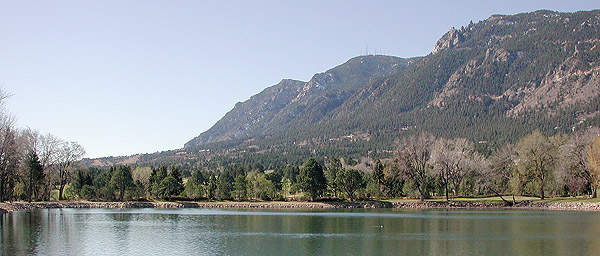
The alert reader will surmise that I must be in Colorado.
That's right. My former graduate student Congzhou He and I are presenting
this research
at the International Congress on Schizophrenia Research.
This picture was taken on the grounds of the conference site, the Broadmoor Resort.
I leave it to you to find out what
"Broadmoor"
means to a British psychiatrist... Not
at all the same thing.
While at the conference, I learned that this Daily Notebook is read by eminent psychiatrists
in at least two countries —
whether for entertainment or as an object of study, I'm not quite sure.
So what's new in brain science? Here are a few things that caught my eye:
- Cognitive remediation is big. That is, patients can be trained to "think their way
around" their symptoms (e.g., to recognize paranoid thoughts as unfounded), and more generally
to rebuild mental skills that the disease has eroded.
The great advantage of cognitive remediation
is that, unlike drugs or even Freudian analysis, it can't possibly do any harm. At worst,
you give the patient some useful mental exercise that doesn't happen to score a direct hit on his
particular problem. You're not going to upset his body chemistry or
reopen old psychological wounds.
On a related note,
Aaron Beck's cognitive treatment for depression made it onto the
cover of this week's Forbes Magazine.
Psychotherapy today is a lot different from what it was in Freud's time.
- Transcranial magnetic stimulation (using electromagnets) is also big. It has produced
relief of symptoms in patients who hadn't responded to medication. It's relatively safe.
- Two or three papers reported that cannabis (marijuana) can cause loss of brain tissue.
We're waiting for more research on that one. But every year, cannabis turns out to be more harmful
than anybody thought even a year ago. But at least — according to another paper presented here —
the deleterious effects of cannabis and methamphetamine somewhat counteract each other.
Abstracts of the entire conference are in the
current (March 2007) issue of Schizophrenia Bulletin.
Permanent link to this entry
 Quarter-century mark
Quarter-century mark
On April 2, 1982, I finished my Ph.D.; that is, that's the day I left Yale, having stayed an
extra day to avoid finishing on April Fool's Day. That was 25 years ago today.
Permanent link to this entry
Sebastian Shaumyan, linguist
And I've just received word of the death of a Yale professor
for whom I had been a teaching assistant,
Sebastian Shaumyan,
at the age of 90.
Before 1960, Shaumyan was practically the only person other than Chomsky who tried to make
mathematical models of human sentence structure.
His "applicative grammar" contained a number of unique insights.
More to the point, Professor Shaumyan had a deep respect for his own students — a quality
often lacking in the competitive Northeast. He was well-liked and will be missed.
Contrary to the published obituary, he did not retire in 1975. I think the correct
date was 1985.
Permanent link to this entry
A few more Colorado notes
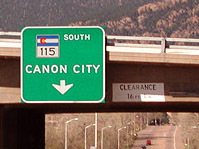
|
|
So where's Nikon city, then?
Actually, the sign should say Cañon City.
Presumably the tilde was taken by the same thief who
got Pike's apostrophe.
|
One other curiosity of the visit was the triboelectric bed.
My pajamas, the sheets, and the low humidity conspired to produce hundreds of
miniature, silent lightning bolts (1 to 5 cm long) every time I moved during
the night. Quite a show! If I'd brought a better camera I would have tried
to photograph it.
Recommended Colorado Springs restaurants: Hunan Springs (good Chinese
food, downtown); also (don't laugh) Cantina Azul near Gate 6 in the airport
(excellent chicken burrito).
By the time you read this, I'll be back home in Georgia, and probably too busy
to write anything for days to come.
Permanent link to this entry


|

|
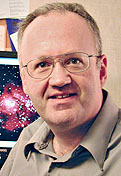








 The Nikon Coolscan III LS-30 film scanner is a SCSI device and is a bit tricky to get working
under Windows XP and Vista.
Here's how I got mine working under Vista.
I am using an Adaptec 2930 SCSI card, but others should work equally well.
The Nikon Coolscan III LS-30 film scanner is a SCSI device and is a bit tricky to get working
under Windows XP and Vista.
Here's how I got mine working under Vista.
I am using an Adaptec 2930 SCSI card, but others should work equally well.








 You can misinform people by asking questions
(e.g., "Has he stopped beating his wife?") just as much
as by making statements.
And here's a poll question that misinforms people.
It was taken on CNN.com on April 12.
You can misinform people by asking questions
(e.g., "Has he stopped beating his wife?") just as much
as by making statements.
And here's a poll question that misinforms people.
It was taken on CNN.com on April 12.







 Quarter-century mark
Quarter-century mark
